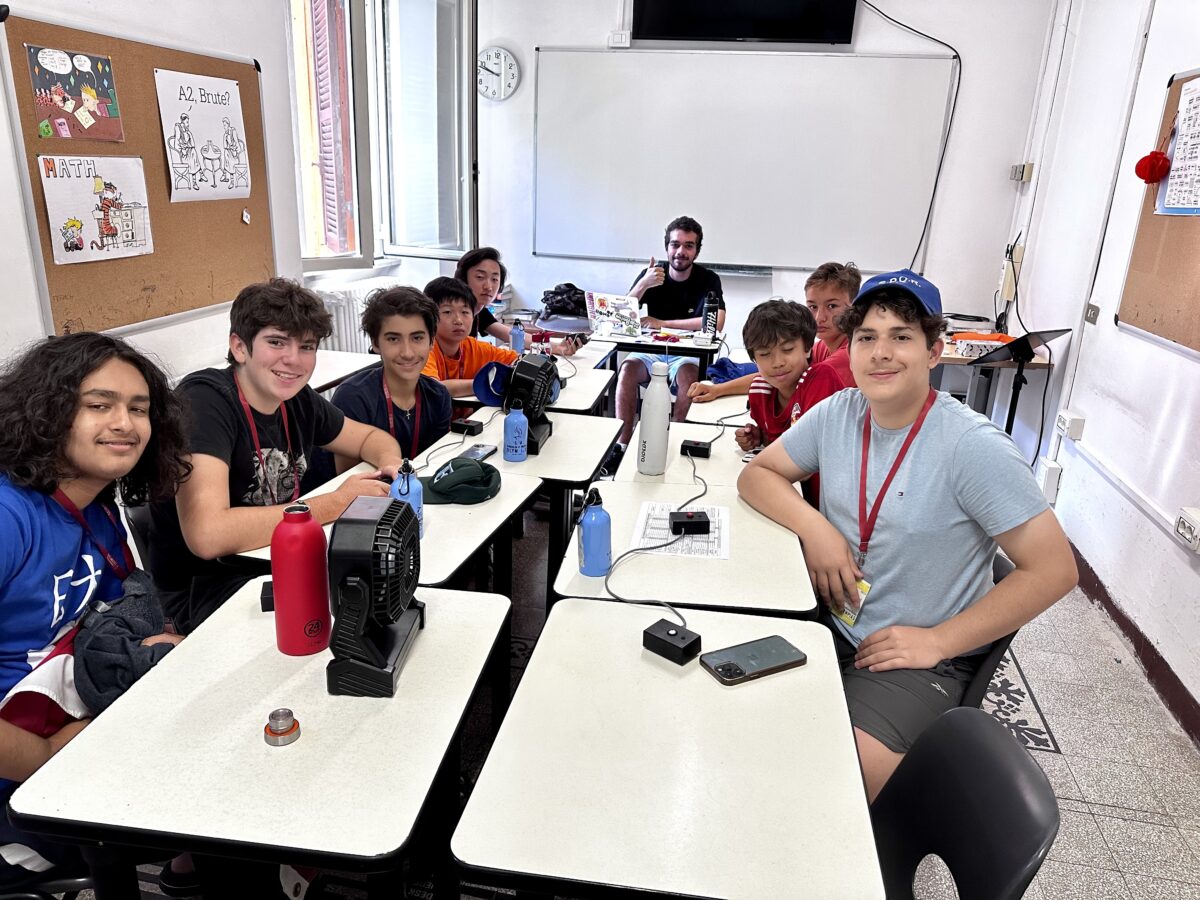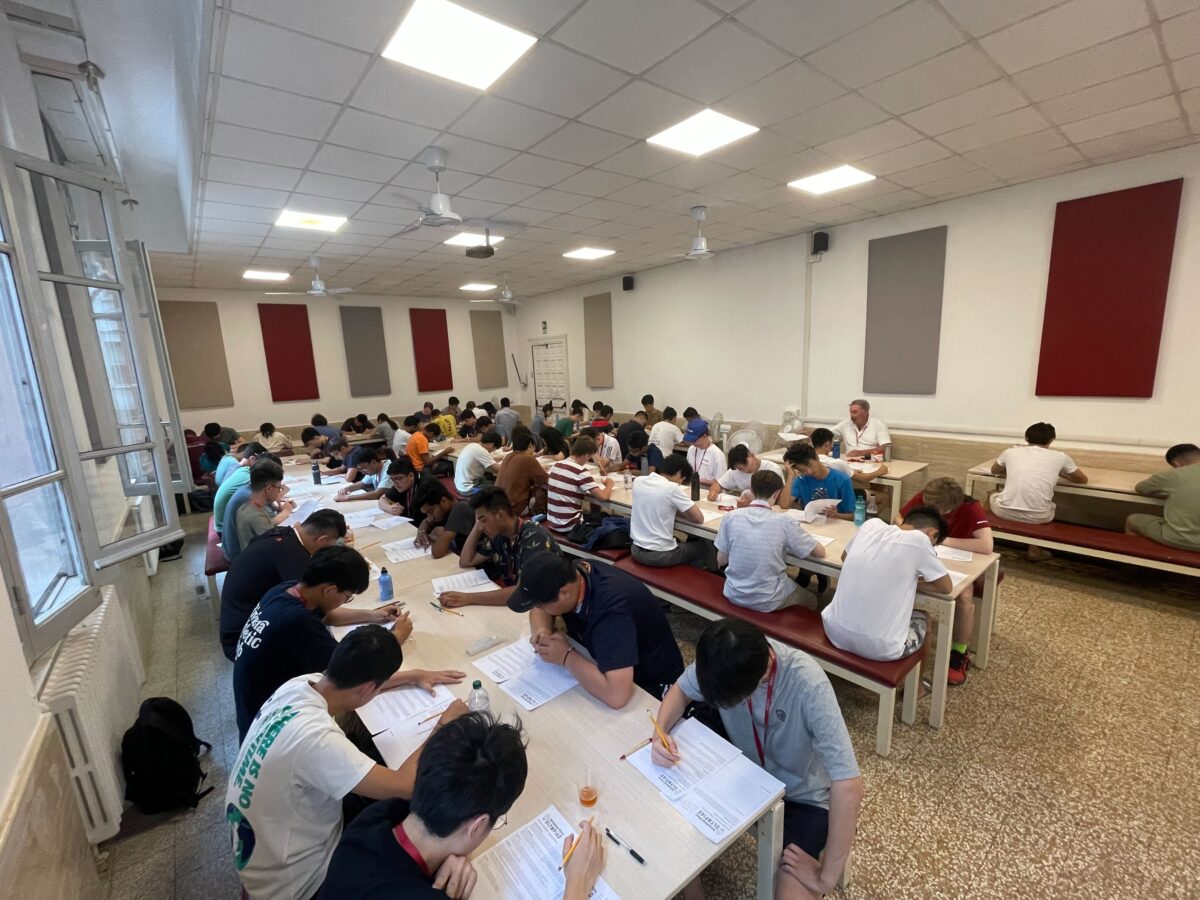National History Bee
Middle & Elementary School Divisions Homepage
2025 National Champions:
8th Grade – Jack Kastellec, Princeton Middle School, NJ
7th Grade – Taylor Chen, Avery Trace Middle School, TN
6th Grade – Bolin Zhang, Spring Branch Academic Institute, TX
5th Grade – Aprameyan Ramanujan, Spring Hill Elementary School, VA
4th Grade – Keaton Finan, Finan Homeschool, WA
3rd Grade and Younger – Nathan Wang, Pingry School, NJ


The National History Bee Middle & Elementary School Divisions Overview

The National History Bee is a quiz competition for individual students, testing knowledge of the history of all eras and all parts of the world. Students first take the free Online Regional Qualifying Exam (ORQE) which is available in the fall. Approximately 60% of these students move on to the Regionals. Regionals are held both online and in-person from October-May and feature paragraph length quiz questions with questions moving from harder to easier information on each topic. Students ring in with a buzzer to answer the questions; if they are correct they get the point; if not, they cannot ring in again on that question. The top 50% of students in each age division at each Regionals qualify for the National History Bee National Championships, which also feature buzzer-based rounds in this format.
Jump To:

Competition Format
For students competing in the Middle School and Elementary School Divisions, the National History Bee is a three-stage competition, consisting of an Online Regional Qualifying Exam, the Regionals, and the National Championships. Students can also qualify for the International History Olympiad by competing in the National History Bee.
1
Online Regional Qualifying Exam
The first stage of the National History Bee for the Middle and Elementary School Divisions is the Online Regional Qualifying Exam (ORQE). Prior to taking the ORQE, teachers, administrators, parents, or another adult family member must first create a free sponsor account at www.iac-exams.com. Once they have created an account, sponsors will receive the link to the exams, and students can take the ORQE at any point. There is no cost to take the ORQE and there is no hard deadline for students to take it: the ORQE will remain available until the registration deadline for the last Regionals passes. However, we recommend that students take the ORQE as early as possible in the academic year so that they have more time to prepare for the Regionals and compete at up to 3 Regionals sites if they qualify.
Online Regional Qualifying Exam: Exam Structure
The ORQE is a 50 question multiple choice exam (4 answer choices per question) on all aspects of world history. Students have 20 minutes to take the exam, and the exam is scored automatically and immediately. In most cases, sponsors will see if the student qualified immediately in the Sponsor Dashboard, though early in the academic year, some students may receive a designation of “pending” if their score is close to where the qualifying cutoff score will be set. Once it is set, the pending designation will be removed and students will be listed as Qualified or Did Not Qualify in the Sponsor Dashboard.
There is no penalty for an incorrect answer, so students should answer each question as best as they can. The exam is designed so that on harder questions, students can often rule out 1 or 2 answer choices. About half of the questions have a visual component (i.e. a map, photograph, chart, etc.); for visually-impaired students who need to have the exam read out loud to them, these questions are not counted and their scores are prorated.
Online Regional Qualifying Exam: How to Prepare & Qualification Procedures
Students should use the ORQE versions from prior years to prepare (see Practice Resources), and perhaps review some basic knowledge of famous people and events in history. Nationwide, approximately 60% of students who take the ORQE will qualify for the Regionals. The qualifying scores vary from year to year and by age division, but typically students need to answer 20-25 of the questions correctly in order to qualify. If students do not qualify on the ORQE, a second-chance ORQE is available beginning in January so that they can try again.
For all questions on the Online Regional Qualifying Exam, please email ems-info@iacompetitions.com.
2
Regionals
The second stage of the National History Bee for the Middle and Elementary School Divisions is the Regionals. The Regionals are held throughout the year both online and in person. A full list of Regionals is available here on the Registration page. Students who have qualified on the ORQE may compete up to 3 times at the Regionals. The Regional tournaments are held in conjunction with the Regionals for the National Geography Bee and National Science Bee, so students who qualified on the ORQEs for those subjects can compete in all 3 events.
Regionals: Timing of Tournaments
At in-person Regional tournaments, typically the History Bee is held in the early afternoon; the Geography Bee is held in the late afternoon, and the Science Bee is held in the morning. At online tournaments, the Bees for two subjects are held on a Saturday, and the third is held on Sunday afternoon. The time and day that each subject is contested on an online event varies from one tournament to another, so that students who cannot compete on Saturdays (or Sundays) will have options to play all subjects at their preferred time and date over the course of the academic year.
Regionals: Tournament Structure
The Regionals consists of 3 preliminary rounds, each with 30 questions, and 1 Final Round, likewise with 30 questions. All students play in all preliminary rounds; the scores are then added together to determine placement. Typically 20-50% of students then make the Final Round to determine the Regional Champion in each age division. To qualify for the National Championships, students must finish in the top 50% of their age division after the preliminaries rounds, inclusive of odd numbers and ties for the final Nationals spot, among students who have not already qualified for Nationals. Students who have already qualified for the National Championships at a prior Regionals are not counted in determining the top 50% of students for Nationals qualification. There are separate age divisions for students in 8th grade, 7th grade, 6th grade, 5th grade, 4th grade, and 3rd grade and younger. At some tournaments with small numbers of students in an age division, two or more divisions may be consolidated. However, the qualification for the National Championships will be determined solely based on a student’s official age division: students are never at a disadvantage in terms of national championships qualifying if age divisions must be consolidated.
Regionals: Game Play Rules
All questions at the Regionals are played using a buzzer system and take the form of a short paragraph. Please see here for sample questions to practice with. The questions are read out loud to students, and the clues in each question are arranged in descending order of difficulty. Students buzz in as soon as they think they know the answer. If they are correct, they score a point; if they are incorrect, they cannot ring in again on that question. Three incorrect answers kills the question. If a student is the third student incorrect before the end of the question, they lose a point (because they have killed the question for the remaining students who now are unable to hear the rest of the question). If they are the first or second student incorrect, or if they are the 3rd student to answer incorrectly but the question has already been read to completion, they do not lose a point.
Once students reach 5 points in a round, they are done for the rest of the round. This ensures that if one student is particularly gifted, they will not run away with most of the questions while the other students get frustrated. However, students can earn up to 10 bonus points in each round depending on how quickly they go out (i.e. a student who answers the first 5 questions correctly scores 15 for the round).
Regionals: Study Guides
Each Regionals is played using one of three question sets: Red, White, or Blue. There is no difference between the sets in terms of content focus or difficulty. Students can compete at up to 3 Regionals, once on each question set. Each question set has a Study Guide that is compiled once the questions for that question set have been written, so students who are competing at a tournament should review the correct study guide in advance! The Study Guides do not contain information on every question in the tournament, but they typically reference things to know about harder topics that will come up.
Regionals: Tournament Registration and Logistics
Students and their families must register for each Regionals tournament on the Registration Page. Typically, the deadline is 12 days in advance of each tournament, but please check the Registration Page to be sure. After the deadline passes, a wait list is maintained for each tournament: we will attempt to accommodate as many students as possible, but we need to ensure sufficient staff first. The cost to compete in the Regionals of the National History Bee is $49 per tournament with a $10 surcharge if registered for after the deadline. There is no obligation to bring a question reader or buzzer system to the tournament; IAC will provide these. An email will be sent in the week prior to each tournament, as well as within a week after the tournament with further logistical details.
For all questions on the Regionals, please email ems-info@iacompetitions.com.
3
National Championships
The third stage of the National History Bee for the Middle and Elementary School Divisions is the National Championships which is held on Memorial Day weekend at the Hyatt Regency Orlando. The National Championships for the National History Bee are also held in conjunction with the National Championships of the National Geography Bee, National Science Bee, and many other events. Students who have qualified for the National Championships in the National History Bee are also qualified for and encouraged to compete in the all-American History-focused US History Bee and the National History Bowl, a buzzer-based competition for teams of students from a school or homeschool association. Solo student teams are also welcome and encouraged to compete in the History Bowl. There are also a number of History-themed National Championship Exams. Each event is held at different times during the weekend, so students who wish to compete in multiple events may do so.
National Championships: Tournament Structure
At the National Championships, all students compete in 4 preliminary rounds using the same style of questions on which they played at the Regional Finals. The rounds are held in different blocks of 2 rounds each. Students are assigned to 2 blocks based on their full schedule of events for the weekend. Students’ preliminary round point totals are summed, and then the top students (usually around the top 25-35%) qualify for the Playoff Rounds. The number of students who qualify for the playoffs is a function of enrollment in each age division at Nationals, and will be clarified to all before the competition begins.
Registration for the National Championships is done on this page. Nationals weekend will also feature many other events, including the Opening Ceremonies, a Family Quiz Night, Universal Studios Night, Intro to Model United Nations, various talks and receptions, and the Jeopardy! Charity Games. A full schedule of the 2025 Nationals Events is available here.
For all questions on the National Championships, please email ems-info@iacompetitions.com.
Stage
International History Olympiad
Students who compete in the Middle & Elementary School Divisions of the National History Bee can qualify for the 2025 International History Olympiad which will be held in Paris from July 20-26, 2025! Students qualify for the International History Olympiad by:
- finishing in the top 33% in their age division at any 2023-24 or 2024-25 National History Bee Regional Tournament.
- playing on a team that finishes in the top 25% in their age division at any 2023-24 or 2024-25 National History Bowl Regional Tournament.
- finishing in the top two thirds at the 2024 or 2025 National Championships of the National History Bee.
- playing on a team that finishes in the top 50% in their age division at the 2024 or 2025 National Championships of the National History Bowl.
- obtaining a passing score on the International History Olympiad Qualifying Exam.
There are other qualifying methods as explained here, but these approaches are the most typical ways to qualify.
The International History Olympiad is a week-long event with numerous competitions, field trips, family activities and more. In each event, medals are awarded to the top 3 competing students in each age division. US students compete for their state; students from other countries (or students in the USA who were born abroad or who have foreign citizenship) represent those countries. Two of the most prestigious events at the Olympiad are the International History Bee World Championships and the International History Bowl World Championships; an overall Olympiad Championship title is also awarded in each age division; please view the website at www.historyolympiad.com for further details on all events and to register.
For all questions on the International History Olympiad, please email olympiad@iacompetitions.com.
Alternate Qualifying Track

Rules & FAQs
National History Bee Practice Resources
National History Bee Results
Past National Champions
On mobile, swipe right to view all columns
| Year | Division | National Champion | School | City | State |
|---|---|---|---|---|---|
| 2025 | 8th Grade | Jack Kastellec | Princeton Middle School | Princeton | NJ |
| 2025 | 7th Grade | Taylor Chen | Avery Trace Middle School | Cookeville | TN |
| 2025 | 6th Grade | Bolin Zhang | Spring Branch Academic Institute | Spring Branch | TX |
| 2025 | 5th Grade | Aprameyan Ramanujan | Spring Hill Elementary School | McLean | VA |
| 2025 | 4th Grade | Keaton Finan | Finan Homeschool | Newcastle | WA |
| 2025 | 3rd Grade & Under | Nathan Wang | The Pingry School | Short Hills | NJ |
| 2024 | 8th Grade | Malcolm McIntyre | Alice Deal Middle School | Washington | DC |
| 2024 | 7th Grade | Sebastian Jones | Dent Middle School | Columbia | SC |
| 2024 | 6th Grade | Miller Angevine | Woodward Academy | College Park | GA |
| 2024 | 5th Grade | Yichen Tan | Mayfield Junior School | Pasadena | CA |
| 2024 | 4th Grade | Aprameyan Ramanujan |
Spring Hill Elementary School | McLean | VA |
| 2024 | 3rd Grade & Under | Jayden Xu | Fall Creek Elementary School | Fishers | IN |
| 2023 | 8th Grade | Padraig Finan | Risdon Middle School | Newcastle | WA |
| 2023 | 7th Grade | Malcolm McIntyre | Alice Deal Middle School | Washington | DC |
| 2023 | 6th Grade | Sebastian Jones | Dent Middle School | Columbia | SC |
| 2023 | 5th Grade | Miller Angevine | Woodward Academy | Atlanta | GA |
| 2023 | 4th Grade & Younger | Aarnav Rudraraju | Challenger Ardenwood | Newark | CA |
| 2022 | 8th Grade | Anthony Zhao | Longfellow Middle School | Falls Church | VA |
| 2022 | 7th Grade | Parker Jelke | Ransom Everglades School | Miami | FL |
| 2022 | 6th Grade | Bhaskar Moorthy | Glasgow Middle School | Baton Rouge | LA |
| 2022 | Elementary School | Neel Jayaraman | TAG Young Scholars School | New York City | NY |
| 2021 | 8th Grade | Arin Parsa | Stanford Online High School | Redwood City | CA |
| 2021 | 7th Grade | Shounak Bhindwale | Harvest Park Middle School | Pleasanton | CA |
| 2021 | 6th Grade | Parker Jelke | Ransom Everglades School | Miami | FL |
| 2021 | Elementary School | Malcolm McIntyre | Hearst Elementary School | Washington | DC |
| 2020 | 8th Grade | Bradford Kimball | Buckingham, Browne & Nichols | Cambridge | MA |
| 2020 | 7th Grade | Arin Parsa | Homeschool | San Jose | CA |
| 2020 | 6th Grade | Shounak Bhindwale | Harvest Park Middle School | Pleasanton | CA |
| 2020 | Elementary School | Matthew Yang | Centennial Lane Elementary School | Ellicott City | MD |
| 2019 | 8th Grade | Vaibhav Rangan | Joaquin Miller Middle School | San Jose | CA |
| 2019 | 7th Grade | Daniel Figueroa | Ransom Everglades School | Miami | FL |
| 2019 | 6th Grade | Arin Parsa | Challenger Almaden | San Jose | CA |
| 2019 | Elementary School | Marc Lindemann | Laddie A. Decker Sound Beach School | Miller Place | NY |
| 2018 | 8th Grade | Robert Muniz | Midtown Classical Homeschool | Tallahassee | FL |
| 2018 | 7th Grade | Rishabh Wuppalapati | Daniel Wright Junior High School | Lincolnshire | IL |
| 2018 | 6th Grade & Younger | Arin Parsa | Challenger Almaden | San Jose | CA |
| 2017 | 8th Grade | Arjun Nageswaran | Aptakisic Junior High School | Buffalo Grove | IL |
| 2017 | 7th Grade | Robert Muniz | Midtown Classical Homeschool | Tallahassee | FL |
| 2017 | 6th Grade & Younger | Siddharth Kamannavar | Stratford School-Sunnyvale | Sunnyvale | CA |
| 2016 | 8th Grade | Govind Prabhakar | Aptakisic Junior High School | Lincolnshire | IL |
| 2016 | 7th Grade | Enzo Cunanan | Trinity Preparatory School | Winter Park | FL |
| 2016 | 6th Grade & Younger | Robert Muniz | Midtown Classical Homeschool | Tallahassee | FL |
| 2015 | Middle School (7th-8th Grades) | Benji Chiu | Stoller Middle School | Portland | OR |
| 2015 | Elementary (6th & Younger) | Enzo Cunanan | Trinity Preparatory School | Winter Park | FL |
| 2014 | Middle School (7th-8th Grades) | Alex Schmidt | Seven Generations Charter School | Emmaus | PA |
| 2014 | Elementary (6th & Younger) | Siddharth Kamannavar | Stratford School-Santa Clara | Santa Clara | CA |
| 2013 | Middle School (6th-8th Grades) | Jonathan Tran | Stoller Middle School | Portland | OR |
| 2013 | Elementary School (5th Grade & Younger) | Foster Michaelis | Medlock Bridge Elementary School | Johns Creek | GA |
| 2012 | Middle School (8th Grade & Younger) | Tajin Rogers | Longfellow Middle School | Falls Church | VA |
